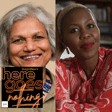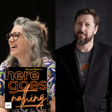Become a Creator today!Start creating today - Share your story with the world!
Start for free
00:00:00
00:00:01

Episode 6: Talking Money with Jo Malone
Talking about money can get uncomfortable but it's important to talk about it!
In the arts, the world of philanthropy can be a tricky on to navigate - we all know we need to raise private funds to support the organisation and the work they create.
This, expert philanthropy manager, and friend of the pod, Jo Malone returns to talk about money, how to raise it, how to give it and how to ensure you have a will.
Transcript
Introduction & Guest Overview
00:00:04
Speaker
Welcome to Here Goes Nothing. I'm your host, Georgia Malone. What do you do with your money? A personal question I know. Best not talk about it. Well, my guest and i often talk about it and believe there is a lot of benefit to thinking about what is important to you and to give where you can.
00:00:23
Speaker
Friend of the pod, Jo Malone returns. Jo has worked in philanthropy in Western Australia for 20 years.
Perspectives on Philanthropy
00:00:29
Speaker
And this week we talk about philanthropy from both the side of the fundraiser and as a donor.
00:00:34
Speaker
We discuss bequests and how easy it is to set up a will and explore the impact that the greatest wealth transfer in history will have on private giving in Australia. You might think this is only interesting to arts managers and those working in the field, but a chat between mum and I never takes a linear path.
00:00:52
Speaker
And it may help you reconsider how you too can be a philanthropist. Join us for the next hour as we explore these topics and skillfully navigate not mentioning a single name or organisation and avoid a defamation suit.
Taboo Topics in Philanthropy
00:01:06
Speaker
Enjoy.
00:01:08
Speaker
They say you should never talk about death or taxes. Well, today we're doing both. Why on an arts podcast would you do that, you may ask? Well, we are talking about philanthropy, private giving and bequests.
00:01:21
Speaker
And for this discussion, we welcome back Jo Malone, who is an expert in all things philanthropy in the arts. Hello, Jo. Hello, George. How are you going? Oh, good. I just wanted to preface this conversation to say that these are our personal opinions.
00:01:35
Speaker
Mm-hmm. might be surprised we have a lot of them. um And this is in no way affiliated the places we currently work or have worked.
Arts Funding Models: Australia vs. US & UK
00:01:42
Speaker
So the arts as a model is ah is a subsidised model.
00:01:47
Speaker
we you know you all the All the great art that we see um in theatres and in galleries is often subsidised by government and other funding sources as it's not... a commercially viable model that can make profits and relies on funding.
00:02:03
Speaker
um And government is currently the main source of funding. And why do you think it's important that the government supports the arts? It's interesting. I think in Australia, it it has um the government has a very strong it has always had a strong role in in supporting arts and supporting the arts Largely because there's no other source that can can do it.
00:02:23
Speaker
um Interestingly, ah from my experience, we have the American model, which is very largely um The arts are funded through private philanthropy with very little government um input.
00:02:38
Speaker
um England is very much, from what I can understand, very government focus government focused with um less philanthropic support.
00:02:49
Speaker
And Australia is somewhere in between. Yeah. So we kind of, we have government support, but we also have give philanthropic support, which is a bit of a double-edged sword because quite often people will say, why should I give to the arts?
00:03:01
Speaker
It's the government's job. I pay my taxes. I pay my taxes. So you you can, you're my taxes will subsidise my seat at the opera or the ballet.
Role of Arts in Society and Politics
00:03:10
Speaker
But we all know that the government's role is fundamentally to maintain the infrastructure and the core of what the arts do.
00:03:22
Speaker
And it's up to the arts to then generate their own income, either through ticket sales, which is never going to do it, or through phil philanthropy, through people supporting them.
00:03:32
Speaker
And I think, yeah, it's important to note about the the reason the government should support the arts is because it's fundamental. to society, to have a really strong, vibrant arts sector is essential for a good and strong democracy, a democratic culture and community-driven places that we live.
00:03:51
Speaker
It's really important to have that and it's a government's role to kind of think about the wellbeing of its people and the arts play is such an ah vital role in that. It's interesting because, and if you talk to any politician about the government's um support for the arts and why it's important and why they put it in it.
00:04:09
Speaker
You get a lot of um warm, fuzzy statements about how important it is in the culture as well. But I'm not going to get too cynical about about this, but it's it's enough. it's enough They support it enough to fulfil that, to say that with some truth, to say the government is supporting arts, but it's not quite enough. No.
00:04:32
Speaker
it it It puts unnecessary, it gives them enough to give um arts organisations the confidence to be able to go, okay, we can do this show, yes, we can do this thing because we've got government funding, we can maintain our organisation.
00:04:46
Speaker
But the stresses and strains with coming coming and with um producing new works, through being innovative, by doing new things. By doing things that might not align to the values of the current government or incoming government.
00:05:01
Speaker
Yeah. So... it's kind of it almost shoots itself in the foot in that way. You feel as though if you just gave a bit more, it would help or gave people, gave organisations or trusted organisations to be able to do things that might fall outside their political purview.
00:05:22
Speaker
it ah It would be much better. that They wouldn't have to stress about, you know, can I use these words? Can I do this show?
Private Philanthropy in the US
00:05:28
Speaker
Mm-hmm. Will it fit with the political thing of the time or the government of the day?
00:05:34
Speaker
Or if i if I get funding for it today, if the government changes tomorrow, will I lose my funding? How very relevant of this time. Yes. um And, you know, going back to the the US model, um we're saying there's a lot more private giving in there, but that's mostly because the they do the federal government funding is through the National Endowment for the Arts, which um is minuscule as it is.
00:05:57
Speaker
And in the new administration and wonderful doge behaviour, I'm sure it will disappear very quickly. um So that private giving in that in the arts is essential to be able to, for for any arts organisation,
00:06:10
Speaker
um Why is it that it's kind of been set up that way, do you think? In America? Yeah. Well, from the little research that I've done, because I don't spend a lot of time doing that, my understanding is that the America was built basically on private enterprise and private money. So if they wanted to open up you know cattle ranches or sheep farms or whatever, it was private money that put in the railway lines, that built the towns, that set up the banks,
00:06:39
Speaker
and and in larger cities put built the um cultural institutions like libraries and universities and art galleries. It was private money and it's why you see so many of these institutions that are named for or after people.
00:06:53
Speaker
And all the the ah institutions that we admire so much in New York, like the museums and all the extraordinary art galleries there, are all funded the philanthropic support for those institutions is mind-boggling because there's a um there's a basic understanding that if you want that level of institution, the only way you're going to get it done is through private philanthropy and the government's not going to put the money in. They'll go, that that's a private thing. yeah So I think it's it's basically part of um the DNA in America, particularly in wealthy families,
00:07:30
Speaker
um
Australian Generosity & Fundraising
00:07:31
Speaker
to continue to do that. um I mean, i'm I'm sure it's not across the board. I'm not quite sure what percentage of Americans give, but um at the higher level it's it's huge amounts.
00:07:43
Speaker
Yeah. I think their tax incentives are quite good when it comes to giving. So philanthropy is a another way of raising funds and philanthropy or fundraising.
00:07:55
Speaker
um what is the what is the What is the landscape like here in Australia? Yeah.
00:08:01
Speaker
it's Look, i'm um I always look at the positive side of things and I think ah people are naturally generous. There's a natural um desire to help and to support. So the times you see the greatest outpourings of um ah fundraising or philanthropic passion is around disasters that we have so often here, and bushfires, floods,
00:08:26
Speaker
any anything like that where people are in need, everyone dips into their pocket and gives something based on their capacity. So there's a natural generosity. And then there's like we have this wonderful institution um in Western Australia, the the Telethon fundraising every year that just is this great source of where everyone, everyone in Western Australia donates to Telethon. And when I call it a black hole, it means I mean that quite often people will you know we'll put $5 in a jar to support Telethon and think i've that's my philanthropic responsibility for the year.
00:09:05
Speaker
um And it's a fantastic thing and they raise extraordinary amounts of money for a population our size, which is what, and not even $3 million yet.
00:09:16
Speaker
um it They were raised over $74 million I think this year. was It's amazing, last year. um So, yeah, I think in Australia people are naturally generous.
00:09:27
Speaker
When you talk about philanthropy, people go,
Fundraising Challenges & Strategies
00:09:30
Speaker
um well, um I don't have any money. I'm not rich. um And you need to think about what being rich means and fundamentally if you've got a roof over your head and you can feed your family and you've got a job, you are rich relative to a lot of people in this world.
00:09:51
Speaker
So... um like There's ah the sense that, well, that's not my responsibility. They may buy a raffle ticket or a ticket to a fundraising event um and then that's their level of giving and that's my responsibility is done.
00:10:07
Speaker
That kind of giving I would call and is generally known as fundraising. So it's just a specific thing. ah So you give a specific amount of money for a specific cause or a specific thing like ah a ball or something like that where you go along and there's auction items. Potential of something in return. there's ah yeah and there's some Yeah, something in return.
00:10:27
Speaker
Not necessarily tax deductible. It's definitely not tax deductible. Well, philanthropy is yeah altruistic giving. It's giving without any expectation of of return.
00:10:39
Speaker
um they The best philanthropic gift is the untied gift where there's no requirement of acquittal or I need to see the paperwork to see how you spent spent the money.
00:10:52
Speaker
um An untied gift is built on a strong relationship. and strong trust in the organisation. Because often arts organisations are open to finding ways to bring money in, whether it's grants or philanthropy, and will create new projects and new ways of doing things outside what their normal remit is to fulfil the need of that donor or of that that grant giver, um which then creates more work, more burden, more administrative costs.
00:11:22
Speaker
So it kind of, null and void something yeah the benefit to the organization because you're just creating even more work and more burden so untied gifts enable that organization to actually operate and just be and to to be stronger rather than just constantly trying to find something new that might be of interest at that time to those specific people and the thing with um lot It can skew, you know, if can skew the artistic um output of an organisation because they go, well, we want to do this but there's no money out there. Nobody's going to, we can't fund this um in the way we want to but those people over there have got money. Why don't we see what they're giving money for? We'll go and do what they want to do.
00:12:09
Speaker
And it skews your um artistic mission, I think, too. which is I think at the core of artistic institutions is terrible a terrible thing to do.
00:12:21
Speaker
The other thing um is, as you said, is the administrative cost of running fundraising events for a one-off hit of, I mean, it's great to get that money if you can, but um I think if you talk to any arts organisation, particularly if they've been encouraged to run a ball. Never run a ball. Never a ball. gala events, please. if If you add up, if you just look at the hard costs of doing it, know, like set up, getting the band, all of that,
00:12:54
Speaker
you know, event organizers, dress the room, all of the kind of things that go with it. And then you charge like couple hundred dollars a ticket. Someone says, I paid a couple of hundred dollars to come here. I don't need to give any more. Exactly. And that just is covering the cost of your food and your drinks. Exactly. It doesn't cover the cost of your whole team o and the wages of your whole team being completely consumed.
00:13:17
Speaker
um that So if you added that into a cost of some of those ah fundraising events, it, It doesn't make economic sense. Yeah. I mean organisations like Telethon um have, that is one element of a massive machine that they have money coming in, so through the actual Telethon, um but also the ball that they have. and It's just part of it.
00:13:39
Speaker
So yeah it doesn't, it becomes the cost, it becomes much more cost effective to run because that, and there's an expectation from the community that that will happen. um So because it's been going for A very long time. Yeah. um But, you know, youre a small arts organisation that might want to hold some kind of celebration once a year.
00:14:00
Speaker
Yeah.
Engaging & Expanding Donor Base
00:14:01
Speaker
Not a good idea. And and also, you know, were like with any of those things that are successful like that, a lot of the work, all the work is being done beforehand around,
00:14:11
Speaker
getting philanthropic pledges before people walk into that room they know what they're going to donate so it's not like they they walk in sit down have a glass of wine and go oh I'm going to give a lot of money they know what they're going to give before they walk into the room so but it's all about it's as much about the celebration of that and it and the culmination or ah that whole telethon leviathan like the creature that has become and the 24 hours that involves every member of society in western australia and the kids getting involved and doing their cake stalls and things. It's fantastic.
00:14:44
Speaker
It's amazing. Yeah. There's been research rate done recently or some stats done recently, and I'm probably going to misquote them. um okay um west I mean, West Australia is extremely rich state, wealthy state, um resources rich, and yet somewhere around only 27% people all adults give charitably.
00:15:05
Speaker
And so the pool of people giving is quite small. um And then that includes people who might do a one-off telethon donation or might want to these one things. So how, and I know there's a lot of drive within the community about how do we build the pool of people donating? Because you was in the arts, you go to events, it's the same amazing people and everything. And how do we build that group of people?
00:15:27
Speaker
It's just, yeah. How do we do that How do we do that? Well, that's the million-dollar question, isn't it? The thing that I love about Western Australia is, i mean, there's lots of things I love about Western Australia, but um is that we are an incredibly rich and incredibly lucky state. We're very lucky to be living here.
00:15:47
Speaker
So there are a lot of people um here who have the capacity to give and donate, and they do. And you see them um and you see them particularly if we're talking about arts specifically, you see them at at arts events and they're wonderful people and they're generous with their time and their financial support.
00:16:09
Speaker
And they've built amazing ah relationships throughout the arts sector. My great challenge is that there's 10 times more opportunities people out there in Western Australia who would love to be brought into the fold but they're not given the opportunity because they're not asked.
00:16:31
Speaker
So it's um making establishing relationships with those people who may not have been to an art gallery, may not have come to a theatre show or have, but because they're not one of the people that everyone knows, they can nobody's going to invite them to a VIP event or invite them to make a donation of $5,000, $10,000, a million dollars because people don't know who they are. Yeah. um Except you.
00:17:03
Speaker
Well, you know, I like people so I like talking to people and find out what they do. And it's not just it's not just the tall poppies, the faces that you see that are successful. It's all of the organisations, companies, companies,
00:17:18
Speaker
the contractors who so support those main organisations who are doing very well. and fun fun little anecdote here about you, Jo Malone, have been known to being out with me, having a drink, um having a conversation.
00:17:35
Speaker
You look over my shoulder and suddenly you just disappear, leave me on my own. It's okay because I'm your daughter and I expect something. Turn around and you're a deep in conversation with someone I've never seen before it's like, oh,
00:17:47
Speaker
come back 20 minutes later just being needed to talk to them i said what are you doing you're just deserting me but they give that person 100% of your attention at that time yes absolutely because everyone's everyone's important and I think that's you know it's and it's more often not the the least that one the ones that you least expect where there's somebody who might stand out in a crowd and then you go of people and you go well Who are they? Why are they here? i haven't seen them at anything like this before.
00:18:18
Speaker
I need to have a conversation to find out who they are, why they're here. um And usually and most often, this is what I love about it, is it's because they have a passion for where they are. So it can be at a function or an exhibition opening or anything and you talk to people and you start talking about why they're there and what their connections are to that institution.
00:18:43
Speaker
And they go to another place. I love it They go to a place i just love. I just love this institution. I just love this gallery.
Unexpected Philanthropists
00:18:53
Speaker
I just love this company. And you go why?
00:18:57
Speaker
And how does that manifest itself? I mean, you find people who buy tickets to absolutely every show that a theatre company does and donate, um you know, regularly.
00:19:13
Speaker
And you go, okay, who is this person? Are they a wealthy person? ah um Are they somebody who just, I mean, some people will give like the interest they get on their bank account yeah every every six months or something like that, which might be, you know, $26.33. But that's spare. reminds me of that story of that New York couple that are they called?
00:19:43
Speaker
Is it the Vogels? The Vogels. Vogels. The New York couple. who He works in a post office. yeah she You know, they were very middle very middle class, apartment in New York.
00:19:54
Speaker
and they just collected contemporary art and they would collect ah works from artists at the beginning of their careers and they had a soul wits in their bathroom and they couldn't move around their apartment based on the amount of work that they had and they just this amazing collection which I think they donated to the
Impact of Wealth Transfer on Philanthropy
00:20:12
Speaker
Met or something. no should No, Washington.
00:20:15
Speaker
And finally donated the collection but they just devoted their entire lives they just worked and they just put their little money aside that they could and they invested in these artists that became some of the Christo Christo amazing yeah and and and i had this tiny little one bedroom apartment and yeah there was a tiny little of space in their kitchen where they ate yeah and then it was took about nine huge those big trucks yeah to transport it all to Washington And I remember reading something from the curator who who managed the whole thing.
00:20:49
Speaker
And she said she thought they'd enjoy their space, but no, they just kept collecting. So great. So in the there's been a lot of talk recently that there's going to be this, the greatest generational wealth transfer of all time.
00:21:02
Speaker
$3.5 trillion dollars in the next 10 years going from as one as the baby boomer generation starts to leave and the and the general and the wealth is transferred. um is there a Do you find that there's a difference, generational difference in giving at the moment?
00:21:18
Speaker
um You know, is it more older generations or is it just about the age that you are? Yeah, it's true. I think generation generationally there's always a difference because,
00:21:30
Speaker
people's wealth or assets come from a different place. You know, if you're like my parents came through the Depression, so their attitude to wealth and giving is so their giving was probably in community more than in money. um at the moment, I think we're in a good place as far as the boomers are concerned because boomers um have made their wealth and i ah they do understand the importance of giving the ones who have it.
00:21:57
Speaker
I think the younger generations are coming through now are more, discerning is not the word, but more they they think more about it. It's like why would I give to a social conscience ah social conscience kind of thing? Why would I give to a philanthropic, ah you know, philharmonic orchestra when I can save a child in Africa? um And um and and I understand that kind of thinking.
00:22:21
Speaker
So I think people are thinking ah more about how they give or what they give to Having said that, I also find that in Western Australia, our wealth is relatively young.
00:22:33
Speaker
So most of the people who have wealth that they will pass on are people who've made the money themselves. They've done the hard yards. They've worked really hard for it.
Trust & Endowment Funds
00:22:45
Speaker
And they feel a sense of obligation really to an organisation they donate to is to say, well, I've worked really hard for this money. They don't say it out loud, but I've worked really hard for this money.
00:22:56
Speaker
And I want to know that it's going to be used responsibly, um that you're going to do with it um what you say you're going to do with it. So there's <unk> quite often that questioning around, you know, i i will need, I'll give you this much money, but I need um a report on where it's being spent.
00:23:14
Speaker
So, um and that's where I think trust comes in. Yep. If you can give without having an expectation of give me a, you know, a 30-page report on how you've spent my $100, You know, I think that's an unrealistic expectation. It seems that there's also um more often, or arts organisations, the setting up of an endowment fund seems to be more common, or people would like it to be more common, because money can go in and keep making money on itself. So the idea is that ah ah initially a fund is started by a lot quite a large donation um into that fund, so a couple of million dollars to encourage other people to give money.
00:23:55
Speaker
And then that fund, the earnings on that fund is what goes into the operations or to whatever that that organisation decides that fund is for, whether it's making new work or supporting operations of the organisation.
00:24:06
Speaker
So that seems to be something that is happening more more more and more often and more more of interest to people to kind of give toward because they can see that there's perpetual um earnings on the money that they're giving.
00:24:18
Speaker
Yeah, but there's a reverse side to that because a lot of people go, I don't want it to go into a fund. I want to see I want to be able to go and see the results. I want to see the outcomes of um for what I've done. If I want to support Aboriginal education, i want to be able to see those kids get their education and come out and go to university, blah.
00:24:39
Speaker
um The American endowment system is is very sophisticated and universities use it to to huge power for their universities. It's not as well established in in Western Australia, probably more so on the East Coast. i think the University of Melbourne has the largest endowment. Yeah, um and schools now have good endowments.
00:25:00
Speaker
To be able to maintain and run an endowment fund, you need a mature philanthropy program and a mature organisation to be able to, one um prove that you can ah manage an endowment and you have trusted people investing the money that you're not going um somewhere nefarious and also trust that um they're going to be around in 10, 20, 30 years' time to actually realise the yeah impact of that endowment.
Structuring Philanthropy Programs
00:25:29
Speaker
And as we've seen in Western Australia, some of our long-term theatre companies, you know, who've been around for 30 aren't. Aren't.
00:25:37
Speaker
aunt aunt yeah So what happens to endowment? And a lot of people go, no, no, no, you know, using the term the slush fund, which is, you know, ah really not really very good term to use because what it does is it provides, if you trust the organisation, the trust the the organisation has the um the longevity to prove that they can manage and and do what they state, which is in invest your money in perpetuity. So your donation now will be supporting this institution in that for your grandchildren, their their grandchildren in perpetuity. So there's a lot of trust involved in donating to an endowment.
00:26:23
Speaker
But once the benefits of it far outweigh a single one-off benefit gift to a project. So looking at how ah an arts organisation may structure their philanthropy program, philanthropic programs, so there's annual giving and then sometimes they do giving.
00:26:40
Speaker
Everyone structures it differently and it change seems to change every other every couple of years whether the focus is different specific things. Can you give an idea about how those structures might work?
00:26:53
Speaker
um Traditionally we have the annual giving and then we have Christmas giving and we have End of financial year. Love the campaign. They love the campaign. That scatting on approach. We have a new project so we need to raise money for that, which creates of End of financial year. Perfect time. Yeah, absolutely. Why don't we raise money the end of financial year? Why didn't I think of that?
00:27:16
Speaker
Which is now becoming like February because everyone's doing it earlier and earlier. Well, you have to. You have to because otherwise everyone just gets swamped in June. I mean, you happy if you don't do it an end of financial year campaign you're silly but you just need to time it right so yeah there's a lot of thinking about doing that i really don't like the term annual giving i've been fighting against it for years but everybody does it yeah everybody does it and which is to me is a good reason not to do it why not stand out in a crowd why give why not give when you want to give when you choose to give and then renew either at the end of the year or before the end of the year or
00:27:56
Speaker
18 months later, whatever. um
Effective Fundraising Language
00:28:00
Speaker
It just feels like a like somebody came up with this design and in philanthropy school and said everyone has to do annual giving.
00:28:07
Speaker
But it's so ingrained. It's probably done by an accountant. Quite possibly, yeah, yeah, exactly. We need to make sure this month, this month, this is how many is coming in because that's when they said they would. We're going to make them all renew at exactly the same time. Yeah, and and if they haven't given within that year,
00:28:24
Speaker
Sorry. Never want to talk to them again. No, rude. um And so I just think, you know, people give when it suits them, not when it suits the institution, which kind of brings me to the the idea of being donor-focused.
00:28:40
Speaker
So there is there is a logic in end financial year because it is donor-focused. The donor will um benefit from a, it's one of the few benefits they get from true philanthropy, which is their tax deduction.
00:28:51
Speaker
Mm-hmm. So if it's slipped their mind, you just remind them that they can make their philanthropic gift before the end of the financial year so that they can um get the benefit yeah um with a tax deduction.
00:29:05
Speaker
um If it doesn't suit them for then, and quite often um people will donate just after end financial year, or if it's ah an organisation, they may do it you know at a particular time in their um budget rounds.
00:29:20
Speaker
So, yeah, it I think my my biggest focus is around what the donor's needs and expectations are without being, you know, saying they want to do this particular project or that particular project. I don't agree with that. But around their needs as far as coming to meet other other donors or come to things or to be involved with the institution in some way um and when it suits them to donate.
00:29:48
Speaker
You um often say that... You know, language is very important when making these requests and these and you how much you hate the word help. um Can you explain that?
00:30:01
Speaker
Because obviously at people, everyone wants help. I know. Help to me is such a, it's a word of weakness. I mean, and, if you know. If you were there saving sick kids' lives. I was going to say sick kids and disabled dogs and, yeah, absolutely. They need help.
00:30:19
Speaker
Yeah. Because without people's support they can't you know these children will die and these dogs will die you know so they do need help as an arts institution you need to well my belief anyway is to present and we do this present from a position of strength so support us because we are successful support us because we have demonstrated what we do based on what we have been given o so we're proving to you that we um we build philanthropy with our organization we have an amazing group of people who share our passion for the organization or the art form and we're strong and we want you to be part of that strength as well people are more willing to put money after good money after good money um you know if you're having been in a situation where an arts organization is a needing to kind of close um
00:31:19
Speaker
Yeah, trying to raise money for that and it was, it's you know, putting money into a sinking ship and it's just, well, it's impossible and you're never going to raise as much as you need to be able to save that organisation.
00:31:31
Speaker
Yeah, and I just think it's it's a negative space. If if somebody's screaming, um unless you give us some money, where will disappear off into the sunset and we'll never be able to create art again.
00:31:44
Speaker
ah go, yeah, do I really want to support... people who were so desperate, it's and there's no need for that. If if if a the organisation said, we are you know, what we do is important, the artists we support are important, um if you um come with us, we can do this together, we can make great art and create great community connection together, then you go, wow, I can be part of that rather than,
00:32:16
Speaker
oh, how much money have I got in my change pocket, you
Emotional Engagement & Marketing
00:32:19
Speaker
know? o that's That's a personal view and it's not something that I've actually argued at length within the philanthropic community. I think it's really important coming from an arts marketing point of view where I spent a lot of my career um and there was a book written by was an arts marketer from the US called Trevor O'Donnell and he wrote this book. as I mean, it's about 15 years ago now, um but it really changed how I think when it comes to marketing the arts and it's book called Marketing the Arts to Death, How Lazy Language is Killing Culture.
00:32:52
Speaker
And it was kind of changing the way that we spoke about what we did, you know, changing it away from being elitist, the best, you know, we're better than you. Like, you know, come and see our...
00:33:05
Speaker
the best orchestra in the world who have won every award you can ever think of by this internationally renowned award-winning person. It's like, what is it though? Like as an as a punter, as a person who wants to go see that, you want to what am I going to experience?
00:33:22
Speaker
When I sit in that chair in front of that orchestra, am I going to be uplifted, blown away? am i What emotions am I going to feel? um You know, and he'd be really fight against the fact that a lot of orchestra marketing material would feature empty halls, you know, like put a photo of the orchestra and the audience having an amazing time because it's about your engagement with the arts is emotional, personal thing.
00:33:44
Speaker
And you're kind of making it so formulaic powerful. and uninteresting and then blaming why the audiences aren't coming you're blaming blaming them for not coming while you're just rolling out this same generic content really great book I mean it's 15 years old now so the world has changed a lot but I think inherently the inherent message is the same and same with philanthropy it's it's a personal thing it's a personal gift I'm choosing my hard-earned money to go to something why would they give to something it's sort of like
00:34:15
Speaker
unless there's some kind of personal connection or personal relationship. Exactly. and And often people say to me, oh, you're fundraising. If I say I'm in fundraising, they go, oh, my God, that must be so hard.
00:34:32
Speaker
And, you know, it's not hard. it's ah It's a joy. It's a pleasure because you get to meet the most amazing people who share your passion for what it is you're doing.
00:34:45
Speaker
And if they don't share your passion, they respect your passion. um They may be may be passionate about something else. They may be passionate about, you know, visual arts or yeah and symphony orchestras, whereas I'm passionate about theatre and all sorts of other things.
00:35:05
Speaker
So it's just wonderful to walk into a room, to be in a room with a group of people who are so excited to be in that room because they know everyone in that room shares their passion.
00:35:18
Speaker
They know that what they have given has enabled whatever's being presented to be presented so presented. So they get a deep sense of um satisfaction and joy from that.
00:35:33
Speaker
Sometimes it's it's ah quite the opposite because they go, have I put money into this and I disagree with but then they also appreciate the fact that it exists and it's, it um is for someone else, not for them.
00:35:48
Speaker
But so it's about built to me, it's all about building that relationship. So you build a relationship with people who think the way you do, who care about the things that you do and are prepared to make a commitment to it.
00:36:01
Speaker
So as ah has a, as a, as a fundraiser or ah working in that area of philanthropy, you are, giving people an opportunity. You a conduit between them and their capacity and the institute or institution or the um art form that they're passionate about.
Unique Philanthropy Approaches
00:36:21
Speaker
It connects them closer. It gives them opportunities to understand more about the art form. um Donors in a room with artists is one of the most beautiful things I've ever seen, just the way they connect is an electricity between the artist and somebody who's just purchased your artwork.
00:36:39
Speaker
um So that's a real privilege in that to be able to do that for people and connect people things that they're passionate about. And your approach to fundraising is kind of different, I think, to a lot of, um if you know, to textbook way of doing it um and people how people might learn when they They go to do arts management courses.
00:37:00
Speaker
um What kind of sets it apart, do you think? Probably simply it's time, um time and an understanding. So for all of the different institutions, I learnt that, you know, fairly early on in my philanthropic ah fundraising career is that each institution you go to is unique and the people who connect with them are unique.
00:37:26
Speaker
They have unique needs, wants, um likes, dislikes. um And it's it's not cookie-cutting. You can't say every institution does exactly the same thing. And if you read the if you read the textbook, every institution does exactly the same thing and you go blah, blah, blah, blah. And if you're you know if you're a philanthropist and you get 15 people coming in with the same approach, you go, bored now.
00:37:53
Speaker
Whereas... I like to um dig down deep into what is that that quirky little um wriggly thing within an organisation that makes it unique. What is it that perks people's interests that people go, oh, that's interesting, I'm going to dig deeper into that to find out what it's about.
00:38:15
Speaker
um And when you find that in the in the institution and you can actually promote that and get people to to create a curiosity about what that is because if you present it a large institution the same way as you present a small institution or you know different large institutions they're all quirkily have their own quirky difference so it's drilling down to that difference and who the people who come to see you. so And looking at all those people and not dividing them up by who's got money and who's not got money, you divide them up by who shows the most interest.
00:38:55
Speaker
Or dividing them by like age and demographic or put all the young people in the room and give them something fun with other people in the room. you know, whether that's it, it's my approach.
00:39:08
Speaker
and And so building those relationships, and I know they they start from from very small from a very small place and you go, well, what are we doing here because nothing's happening, to you see a year later that number has doubled because those few people have bought more people and then a year later those people and then 10 years down the track you go back and you go, wow this is amazing. You know, now we've got um ah with I don't know how many times more donor donors have
00:39:41
Speaker
giving it much higher levels. We have an endowment fund and all of this has been built out of developing those strong relationships from day one. Yeah, I think that's evidence as well in a couple of the um freelance work that you did working with um non-arts organisations, other charities, and and starting where there was no necessarily any...
00:40:03
Speaker
um fundraising or it was, you know, their targets were quite small um to then just working with that CEO o leader to kind of give them the confidence to realise they know inherently what the ask is and what they can do. And they're very good at it and very good at asking. And suddenly, what is it, about six, seven, eight years later, and hugely successful in fundraising and getting grants and getting getting philanthropy involved.
00:40:28
Speaker
money through the door to ensure that organization is one of the leaders in their field and it's yeah it's that kind of like being patient and you're not going to get the results straight away um which is really frustrating for a lot of boards i think yeah especially in the arts it's like we need to fix this hole right now this is going to fix it and you're not and if you're not fixing it straight away then it's a it's a waste of time absolutely so yeah so just one thing i do want to throw in in there too is By building philanthropy program in that way, ah you are inherently authentic. So you're authentic to your art form and to what you're doing. And when you're talking to somebody, you're not spouting a line that you've learnt by rote.
00:41:13
Speaker
You're not um writing them ah an email or a letter that is a form letter with their name at the top.
Importance of Donor Retention
00:41:20
Speaker
Yeah. It's directed directly to those people. Yeah. like you know, ah really appreciate, you know, what what you're doing. it's fantastic. It was great to see you.
00:41:30
Speaker
It's a conversation between human beings. It's not a fundraiser and a donor. And, you know, there's larger organisations, large charities like the Salvos or things. They do do those scattergun mass mailings and salaries send everyone they've ever looked at a letter and if they get 1% return,
00:41:47
Speaker
that's successful because they're mailing to a million people or so, you know, and so it's sort of if they get a million dollars out of that, then that's great. um But it just doesn't work in the scale when we're talking in the arts organisations. So mail-outs like that, just it just does not work.
00:42:02
Speaker
and they And the power in the relationship um philanropy philanthropy is retention, is that people keep coming back and keep but coming back. And some of the institutions,
00:42:16
Speaker
that we so that I started with to see the people who are still there like 15 years later. They have pride and ownership in that organisation. And they're just like, you know, they're very proud to be part of that yeah that um that group and the to yeah to play a role in the success of the organisation.
Bequests as a Funding Source
00:42:33
Speaker
One area um people that I guess is growing, I guess, um or but every or arts organisations are starting to consider a lot more is around bequests.
00:42:43
Speaker
ah So the CRESS is a way of, is a money for the future, I guess. It's a pledge. it's a It's a non-binding agreement that one day they'll give some money in their will.
00:42:58
Speaker
It seems like a a lot of work for something that hypothetical that might come one day. um You never know when. and um But there seems to be also a lot of potential in that area as well have you done much work in that in the bequest i've done a lot of research in it and and i've seen a lot of success in the way it works and um and revisiting a lot at the moment um and bequests are a really interesting area i mean it's it's quite complex when you dig deep at it but on the surface it's really simple so everyone over the age of 18 should
00:43:39
Speaker
should have a will it's as fundamental as you know making sure you but pay your car license and you pay your know health insurance and things like that because um everyone if they don't have something now they will have something in the future you can change your will down the track there are there are methods now um great ways you can do your will for free and you can make a bequest to different charitable organizations um And that's that's just picked up over the last five or six years and it's getting a lot of traction.
00:44:12
Speaker
Do you think that's because they've made making wills more accessible and free? Yeah, because when, i mean, i always think, oh I've got to update my will. But it means I have to go and find my lawyer who's probably still not on this planet um and is probably in his vault somewhere. and Yeah. And then and then it's how much is that going to cost me and all that kind of stuff. So I'll do it next week.
00:44:34
Speaker
And, I mean, so i I do have a will but it is very old. I'm probably not even in it. you were Yes, you are in it. You are in it.
00:44:45
Speaker
there's... So it's really simple. So everyone over the age of 18 should have a will, but more than 50% of Australians do not, who are eligible to make a will, do not do not have a will, which basically means that if you die tomorrow, 20 years' time, and you haven't got a will, the government decides what happens with your money.
00:45:06
Speaker
So the public trustee takes your... Really? Yeah. I thought like the family did. no No. The public trustee trustee takes... You die in test state, which sounds really uncomfortable.
00:45:18
Speaker
And they will they will say, okay, there's two kids and a dog. Well, you know, the two kids will divide it equally or when all the bills have been paid, they take their fee out of it and then they divide it up between the two kids or whatever.
00:45:33
Speaker
And then one of the kids says, look, im I was a better kid. I should get more or whatever. And then, Or ah they may just say there are no kids. It just goes into consolidated revenue.
00:45:45
Speaker
Yeah, right. So um it's not ah it's not a good thing to do and But I think <unk>s there's a couple of things. One, I haven't got around to it. I know I have to do it, but I'll do it one day.
00:45:55
Speaker
And I don't want to talk about dying. I'm in the first camp. really need to. You really need to. You do need to. really need to. Yeah, you really need to. Why is that? Yeah, I think it and also...
00:46:07
Speaker
Yeah, talking about it becomes a philosophical conversation about mortality and that just suddenly something very practical that goes from a legal conversation um or, you know, about money, which, you know, people can talk about or not, to becoming really like existential. Exactly, exactly.
00:46:27
Speaker
um And it's, I mean, whether it's to do with the age or phase I am in my life, um I find most older people are are more talk about it more easily because they've had to consider those things and they're more likely to have assets like a house or a car or a superannuation fund or whatever.
00:46:48
Speaker
So they're more likely to go, we've got a will, um yeah um So it's going from having the will and it's and where the young ones going, oh, I can't talk about that. I can't talk to people about dying.
00:47:02
Speaker
that's I feel really uncomfortable. So they're putting the the people who are working on those programs, the quest programs, are putting their own personal feelings about death into whether they can. Those people don't work in bequests. They don't. We ask them not to.
00:47:16
Speaker
It's really about um and and so that raises the question then of what happens to my money when I die. um i have been a donor recently to this particular institution or this organisation or I'm passionate about kids learning to play the violin or, um you know, a particular artist or whatever, there's an opportunity then to really make a difference. so you can make a residual gift which is what's left over after, you know, your family's been taken care of. You can leave a percentage of your estate. So you might say 1% or 5% or whatever or you can say X amount of money or,
00:47:56
Speaker
property of some kind it might be a a gold coin collection that can be sold off or it could be a house um because often that happens with in family domestic violence sector people donate or gift houses or like properties for transitional housing yeah yeah yeah so that's fantastic so if and a lot of people who haven't been able to they might be living in a modest house in the suburbs and and are passionate about going to the free ballet concert that's, you know, on once a year or symphony concert, love who love what that's given to them and they want to be able to give back.
00:48:35
Speaker
So they might bequeath their house to them. You know, it's the only opportunity they have. Do you have to tell, though, that organisation that you've done that? No. So unless you want to be on a wall in someone's organisation, but you don't we don't have to tell them.
00:48:53
Speaker
No, you don't have to tell them, which, you know, I like surprises. So I think there's there's a um There's a serendipity in that, that one day you get a phone call to say you've been left, you know, a property or $2 million dollars or whatever. And it's like, whoa, that's amazing. Where did that come from? We didn't know.
00:49:11
Speaker
And I remember one an institution that somebody just turned up at an event and said, I want to present you with a cheque. I'm going, what for? And it came from through a bequest. Yeah. And something we were doing was um based on,
00:49:26
Speaker
It fulfilled the they requirements of that bequest. It was lovely surprise. It sort of becomes then that um the amount of work that goes into developing a bequest program and the collateral, the time, everything like that, sort of like going into the ether of hypothetical one day. So then sort of like that, it kind of contradicts that idea of return and investment and kind of actually investing your time in something when you don't know yeah if it works.
00:49:54
Speaker
it's like paying it forward. Yeah. In a way, and because the thing is you do know because the stats are there. If you have a look at all the research that's done on bequests over long periods of time and these institutions, the organisations are giving free wills at the moment, they've got some ah extraordinary um numbers around that.
00:50:17
Speaker
And apparently the average bequest, not estate but bequest, in Australia is $63,000, which is significant. yeah So and that's averaging out from somebody who leaves $1,000 to somebody who leaves $5 million. dollars um And that's increasing and because people are starting to become more aware of it and having the opportunity to actually.
00:50:46
Speaker
So I suppose the point is when you think about the actual energy, time, resources that go into building a bequest program, compared to running a annual program or or an annual ball.
00:50:59
Speaker
Yes. So, i mean, and there there are stats out on there out there on this too. ah You know, there's no argument. You spend your one day week on your Big Quest program, which one person can't take you. You your one You print your one flyer, you update your website and stuff.
00:51:19
Speaker
But it does take continual maintenance. you have to keep. it up you have to keep reminding people and i've seen bequest programs where or campaigns where it's like give us money and you will and then there's two or three come in then it's crickets yeah nothing's there's no stewardship so if the people who do so who they are um you need to make sure that you look after them. So you steward them as if they had just given you a donation. Yeah.
00:51:52
Speaker
I think there was an example organisation that we know that there was a bequest and one of the things was was that you'd have a ah more board member would have a um cup of tea with them once a month and they just, it went on for years. It just became, it's like, oh, God, he's going to go have a cup of tea now.
00:52:12
Speaker
um And, then you know, and you think, oh, they're quite old, but then they live to their 100. And ultimately withdrew it. Really? how frustrating.
00:52:23
Speaker
Because they didn't go into enough cups of tea. They didn't feel they were being looked after. So, yeah. It's a bit sad, but, you know, that's that's an individual and a sad story. So there are those. So people, you know, that's the whole thing. You can change your mind. If you like, you know, ballet one year and then three years later you suddenly decide you like contemporary art, um you can change it. Yeah. You're not, you can go into your will and change it. um But if you're passionate about something now, you can actually make um that gift now.
00:52:53
Speaker
um It's wonderful when people do um tell tell you that they're going to make a bequest because you can then say thank you properly ah in a personal way. You can include them in um thank you events, things like that, where you you celebrate their gift and they can talk openly if they choose to. And actually use them, or not use them, but like, you know, utilise them to be able to leverage or to bring more people into the program as a test case. Yeah, exactly, to advocate, to say this is a good idea. The beauty of it is you can be a philanthropist without costing you anything and it's a gift for the future.
00:53:34
Speaker
So and oh just a letter that I wrote was about knowing that person who'd made that gift, knowing that they they their child and their child's children will see the benefit of that gift.
00:53:51
Speaker
Yeah. That it's not, you know, whilst all of us will probably not be around when that gift comes to fruition. Yeah. But future generations will.
00:54:03
Speaker
Yeah. And um that's the power in it, and I think, and it's, It really, um when you're talking about arts institutions who need the proof of that sustainability, if a medium-sized arts institution can say we have X amount of dollars pledged in bequests, it gives you a sense that there's some longevity there, there's some trust in the organisation.
00:54:28
Speaker
But I wouldn't, it's not something that I would, I mean, I've always said don't set up a pledge or a bequest um program until you are confident and secure in your philanthropy program that you're comfortable that you've got a broad um base of donors that they're comfortable with you because um statistically 50 of your bequests or 50 of your donors will be quest yeah right so you've got look after them so that they will ultimately be quest so always felt
00:55:00
Speaker
feel that you need to have a mature, and I still believe that. Having
Global Giving Pledge & Personal Philanthropy
00:55:04
Speaker
said that, with this new um idea of giving having writing a will for free and having opportunities to to bequest to a range of different not-for-profits, mainly charities, that they can just tick a box.
00:55:19
Speaker
Yeah. ah This is my will. I'll leave my money to my kids. my kids Oh, and 1% to, you know, this charity and 1% to this charity and 1% to this charity. Amazing.
00:55:32
Speaker
And then you just sign it off and Bob's your uncle. Yeah. It doesn't cost you a thing. There you go. So there's the um the great the giving pledge that was set up in 2010, which a moment where moment where It started by American philanthropists, the Gateses and Warren Buffett, so billionaires, where they made a pledge to give away a majority of their wealth um to charitable causes either before they die or in their wills.
00:55:58
Speaker
um And now it's become an international pledge and there's three ah right australia yeah Australian billionaires that have signed the pledge, um which is, you know, great that there's all this wealth that's going to be in. You know, you can see that very much in Australia Jeff Bezos' is former wife who is just donating just so much money at the moment. I love her approach. Yeah, fascinating conversation. And also there's a conversation about Warren barham Buffett's children about the wealth transfer from Warren Buffett to the children and what the children are going to do about giving away the money.
00:56:32
Speaker
Anyway, that's a whole other conversation about the cleaners. um Do you think that that kind of pledge from the wealthiest in the world, will trickle down to encourage other people, just anybody to give? Or is it kind of in a way saying, well, so they should, A, billionaires should, um and or B, that, you know, they've done it so now I don't have to?
00:56:59
Speaker
Well, I mean, taking that at that end of it, taking it down to, you know, I can't donate because I don't have any spare money or I'm not rich,
00:57:13
Speaker
I can't be a philanthropist. um So I think that at the the micro level also app applies the macro level, you know, like, ah well, I can't do that. Yeah. For one, I haven't got any money, so there's not going to be left anything left to give away anyway. um But then people don't think about their superannuation or, you know, ah other forms of income that they have that they don't tend to focus on.
00:57:38
Speaker
or you know assets they have, even just a car. So I think there's a bit of both. ah I tend to think of it as an excuse or but largely as ill-informed. So, yeah, I mean, the big guys have got big money and they can do big things. And wow, that's fantastic.
00:57:55
Speaker
I would hope what that does is encourage other big guys to do the same thing because bottom line is only only so much you can do, your family can do. They but only live in so many houses and go to so many private schools and whatever.
00:58:11
Speaker
That's fantastic. and they should do that and ah more people should do that. phone capacity Fun fact, Jeff Bezos and Elon Musk are not on the list. But Zuckerberg is, but he did in 2010 when he had a conscience.
00:58:23
Speaker
Anyway. Anyway. So similarly, you you can be a philanthropist if you give to your capacity. So if you've got a spare $5 a month and you give it every month,
00:58:36
Speaker
then that's that's repeat giving. buts That to me is as valuable. um And people who give, so the person who gives gives you $10,000 today just as important as, or the person who gives you $10,000 over 10 years is just as valuable because they've given the same amount of money, but they've really made an effort to make that $10,000.
00:59:03
Speaker
Yeah. that ten thousand dollars with somebody who who has the capacity to be able to just do that. So I think that's what definitely worth celebrating as well and I i do that.
00:59:14
Speaker
So people who give a little bit often, you know, like $100 a month is $1,200 a year and that makes a big difference, yeah particularly to small, medium-sized arts organisations. It's like...
00:59:30
Speaker
Yeah, absolutely. It's huge. So just to wrap up, one last question. You donate. Yes. What motivates you to be a donor? um What motivates me to be a donor is i you know, trust once again i and I believe in the institutions that I donate to.
00:59:49
Speaker
And you want to see how they do it. No. Well, I do that sometimes. I do. Sometimes I just go on and and donate $10 and say, okay, you know. What are you going to for me? What are you going to do now Yeah.
01:00:00
Speaker
And some of them are just fantastic and some of them are just got like crickets. But anyway, that's fine. Find these things out so you can help them to actually get better. But ah believe I believe in the institutions basically and i believe and I trust the institutions to do what they need to do with it.
01:00:18
Speaker
I'm not going to sit there and go, well, I don't give enough to be able to say I want you to do this particular thing. um But I give, I've been giving a long time. Mm-hmm.
01:00:30
Speaker
yeah for some institutions um because I believe that they they deserve to be there and they they do extraordinary things and they ah are wonderful. yeah um so if I get to the point where I go, yeah, I'm not sure that my our values are aligned anymore, um you know, changes as things turn over, ah mission statements change, strategic plans change and you go suddenly you're doing that thing, I'm thinking,
01:00:58
Speaker
Yeah, no, that's not what I signed up
Volunteering vs. Monetary Donations
01:01:00
Speaker
for. Yeah. and but Or, you know, it's it's largely a capacity thing. ah One day I'm going to have to stop working and I'm going to go, ah just can't do this anymore. Yeah.
01:01:10
Speaker
But then at least I feel as though I've done and so something. And where I can't, I don't have the time to go and volunteer and make lamingtons and... Best not.
01:01:21
Speaker
No, no. Or... or Do other things that are not cooking, not cooking. and Never do that to anyone, I promise. ah But a lot of people give through their time.
01:01:33
Speaker
Yep. Which is great, um but doesn't always work with lot of institutions. You can't use volunteers for a lot of stuff because it's about.
Conclusion & Future Discussions
01:01:44
Speaker
um insurance and skills and all those kinds of things and time and time it goes into looking after volunteers to volunteers who are wonderful people wonderful we value them well thank you so much joe i think we've done really well to talk for an hour and not mention a single name um i think that's very rare it is we just spent our lives names drop name dropping and they look at us ah well we were we were very focused we were very focused i nearly dropped a couple of clangers but Yeah, that we don't do that.
01:02:15
Speaker
No. um Well, thank you very much for joining me. And, yeah, it's been really good conversation. Thank you. Thank you for having me. And I'm sure there's lots more conversations in this and I'm sure some people might like to challenge me on some of my yes approaches or that. How dare you? Like learn from you.
01:02:34
Speaker
Yes. Maybe. I think so. Thank you. Okay.
01:02:43
Speaker
Thanks as always to Jo Malone. I'm sure she'll be back again and we'll talk about something completely different. If you're interested in how you can set up your will easily online, or ways you can donate to different charities, check out my Substack at heregoesnothingpod.substack.com and there'll be lots of links there.
01:03:01
Speaker
Next week I'm joined by Jeremy Smith, who has worked in every facet of the art scene, starting out as a lighting designer in the mid-90s. We talk about the history of theatre in Perth and what's changed from producing work back then to now.
01:03:13
Speaker
Till then.
Cultural Acknowledgment & Significance
01:03:15
Speaker
This podcast was made on Whadjuk Noongar Budja, a place I'm very privileged to call my home, and I acknowledge and honour all Noongar people that have been making art on this land for tens of thousands of years and will continue to do so for generations to come.
01:03:29
Speaker
Always was, always will be Aboriginal land. Original music by Lyndon Blue. This is a GM Productions project.













